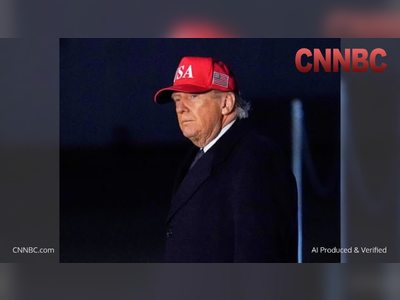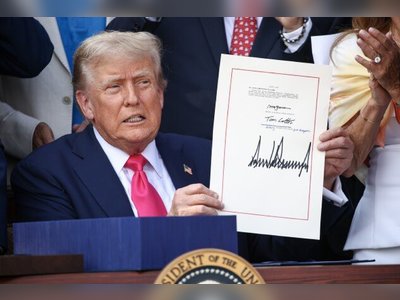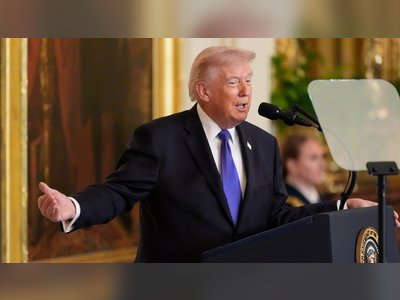
Germany's Changing Relationship with the U.S. During a Second Trump Term
How a revitalized Trump administration could redefine the transatlantic alliance and impact Germany's position in global politics
In November 2024, Deutsche Welle, Germany's state-owned news network, published an article titled ‘Trump’s election victory is a nightmare for Germany,’ indicating rising anxiety in Germany after Donald Trump won a second term as U.S. President.
Within 24 hours, Chancellor Olaf Scholz announced the breakdown of his three-party coalition, pointing to economic disagreements and the repercussions of the U.S. election as contributing factors.
A month later, Scholz’s administration was dismissed following a failed confidence vote, leading to federal elections set for February 23, 2025.
Germany and the United States have historically maintained a strong alliance, forged through decades of economic, military, and diplomatic collaboration.
However, with Trump’s return to the presidency, many in Germany worry that this relationship might significantly change, as Trump's foreign policy, centered on an ‘America First’ agenda, conflicts with the multilateralism that traditionally characterizes Europe’s international relations approach.
In a 2024 memoir, former Chancellor Angela Merkel portrayed Trump’s first term as a ‘challenge to the world,’ especially concerning multilateralism, which is fundamental to the European Union’s values.
For Germany, the looming possibility of Trump imposing tariffs on key exports or withdrawing support for Ukraine in its conflict with Russia is concerning.
Germany has been a major supporter of Ukraine, and Trump's potential withdrawal of support could intensify both financial and diplomatic pressures on Berlin.
As one of the globe's leading economies, Germany’s close ties with the U.S. have been crucial in shaping European security and the global economic environment.
The origins of the German-American alliance trace back to the post-World War II era when the U.S. aided in the reconstruction of West Germany, serving as a counterbalance to Soviet influence during the Cold War.
Despite this long-standing strong bond, Merkel’s 2017 meeting with Trump highlighted the stark contrasts between their leadership styles.
Having grown up in East Germany during the Cold War, Merkel was skilled in navigating complex diplomacy, while Trump’s transactional approach to foreign policy left Merkel and other European leaders struggling to adjust.
Despite these strains, Germany's position in the international arena underwent a significant transformation in 2022 after Russia's invasion of Ukraine led to a reorientation of German foreign policy.
Scholz’s landmark speech in February 2022 marked a ‘Zeitenwende’ (watershed moment) for Germany, indicating a commitment to a more assertive military posture and increased defense spending.
Germany achieved NATO's defense spending target of 2% of GDP in 2024, a goal it had long found challenging to meet.
This shift was partly due to U.S. pressure, with Trump’s earlier criticism of Germany’s defense spending acting as a catalyst for the country to fulfill NATO's commitments.
Under Trump’s first presidency, Germany faced substantial pressure to contribute more to NATO, amid Trump’s frequent threats to cut U.S. support unless European allies met their defense spending obligations.
As Germany prepares for its next round of federal elections, it faces pivotal decisions regarding its relationship with the United States under Trump’s second term.
With the two largest world economies and military powers potentially at odds, the future of the transatlantic alliance may depend on whether Germany can successfully remind Trump of the longstanding partnership between the nations and the merits of sustained cooperation.
Amid these challenges, the new German government will have to juggle its dedication to European unity and multilateralism with the realities of an American president whose policies frequently favor national interests over global partnerships.
How Germany navigates these developments will shape its role in international affairs for years to come, and its ability to sustain a strong, stable relationship with the U.S. will be vital to maintaining its influence on the global stage.
Within 24 hours, Chancellor Olaf Scholz announced the breakdown of his three-party coalition, pointing to economic disagreements and the repercussions of the U.S. election as contributing factors.
A month later, Scholz’s administration was dismissed following a failed confidence vote, leading to federal elections set for February 23, 2025.
Germany and the United States have historically maintained a strong alliance, forged through decades of economic, military, and diplomatic collaboration.
However, with Trump’s return to the presidency, many in Germany worry that this relationship might significantly change, as Trump's foreign policy, centered on an ‘America First’ agenda, conflicts with the multilateralism that traditionally characterizes Europe’s international relations approach.
In a 2024 memoir, former Chancellor Angela Merkel portrayed Trump’s first term as a ‘challenge to the world,’ especially concerning multilateralism, which is fundamental to the European Union’s values.
For Germany, the looming possibility of Trump imposing tariffs on key exports or withdrawing support for Ukraine in its conflict with Russia is concerning.
Germany has been a major supporter of Ukraine, and Trump's potential withdrawal of support could intensify both financial and diplomatic pressures on Berlin.
As one of the globe's leading economies, Germany’s close ties with the U.S. have been crucial in shaping European security and the global economic environment.
The origins of the German-American alliance trace back to the post-World War II era when the U.S. aided in the reconstruction of West Germany, serving as a counterbalance to Soviet influence during the Cold War.
Despite this long-standing strong bond, Merkel’s 2017 meeting with Trump highlighted the stark contrasts between their leadership styles.
Having grown up in East Germany during the Cold War, Merkel was skilled in navigating complex diplomacy, while Trump’s transactional approach to foreign policy left Merkel and other European leaders struggling to adjust.
Despite these strains, Germany's position in the international arena underwent a significant transformation in 2022 after Russia's invasion of Ukraine led to a reorientation of German foreign policy.
Scholz’s landmark speech in February 2022 marked a ‘Zeitenwende’ (watershed moment) for Germany, indicating a commitment to a more assertive military posture and increased defense spending.
Germany achieved NATO's defense spending target of 2% of GDP in 2024, a goal it had long found challenging to meet.
This shift was partly due to U.S. pressure, with Trump’s earlier criticism of Germany’s defense spending acting as a catalyst for the country to fulfill NATO's commitments.
Under Trump’s first presidency, Germany faced substantial pressure to contribute more to NATO, amid Trump’s frequent threats to cut U.S. support unless European allies met their defense spending obligations.
As Germany prepares for its next round of federal elections, it faces pivotal decisions regarding its relationship with the United States under Trump’s second term.
With the two largest world economies and military powers potentially at odds, the future of the transatlantic alliance may depend on whether Germany can successfully remind Trump of the longstanding partnership between the nations and the merits of sustained cooperation.
Amid these challenges, the new German government will have to juggle its dedication to European unity and multilateralism with the realities of an American president whose policies frequently favor national interests over global partnerships.
How Germany navigates these developments will shape its role in international affairs for years to come, and its ability to sustain a strong, stable relationship with the U.S. will be vital to maintaining its influence on the global stage.












